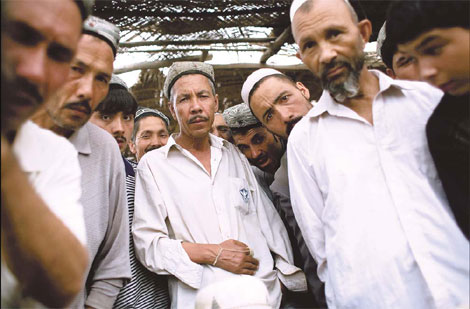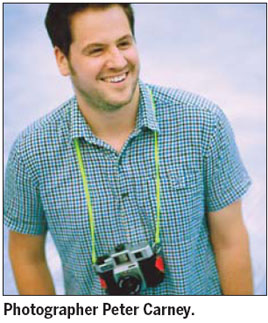Culture
China's changes through a lens
By Jude Alefounder (China Daily)
Updated: 2010-08-02 14:18
 |
Large Medium Small |
 |
|
A photograph of Uygurs, taken by Peter Carney. [Photos provided to China Daily] |
Reviewing composition, monitoring shutter speeds and controlling aperture are daily tasks for Peter Carney. Not only because he is an award-winning photographer but because he is now sharing his skills with others through workshops. It has been a quick progression for Carney since his arrival in China two years ago.
"I was living in South Korea previously, working as a photographer for a music magazine, and decided I wanted to come to China for the Olympic year and study."
After completing an MA at the end of 2008 in Dalian, Carney moved back to the UK and then France for a while, before returning to China in the summer of 2009. "I came back because it is such an exciting time for China and Beijing is at the center of this."
Carney's passion for photography is clear and has helped him to win a number of awards for his work. His most prestigious accolades include getting to the final of the online BBC Photographer of the Year competition and being recognized by The Times. He also won the top prize in 2006 for The Independent newspaper National Photography Competition, sponsored by Canon.

Although his work is quite varied, Carney admits that he does have some specific passions within photography. "I like taking pictures of people and portraits are always interesting." This is another advantage of being in China, as Carney recognizes the difficulties in taking pictures of people in public places in many Western countries.
It seems Carney is truly taking advantage of the some of the unique subjects in Beijing. One of his current personal photo projects is examining the culture of Beijing Guoan fans. "I am going to games to try and capture the atmosphere and hopefully use these pictures as part of a wider project examining football in China as a whole," says Carney.
Despite his continued success, he finds it hard to point out the pictures he is most proud of. Carney remarks that "all photographers go through periods where they like or dislike the pictures they are taking - it's natural."
Carney understands though that his best work comes when it engages other people and has meaning. "I am most passionate about photography when the pictures I take mean something to people," he says. He fondly remembers taking pictures in a small village in the Xinjiang Uygur Autonomous Region and giving out the photos to the villagers. Carney believes that "this type of bond with those you are photographing is what all photographers are looking for".
Not everything is rosy, however, with Carney aware of the challenges raised by new media and the shrinking budgets of magazines, particularly for photographic work. However, he is confident that there are still many great opportunities within China. "I hope I can create projects that people will look back on to help them understand the development in China, because a lot of what we see today will soon be gone or changed beyond recognition," he says.
Despite the challenges of working as a photographer, Carney feels that China is the place to be. "You can build a network here and it is this access that is the key to photography. If you build relationships, you will get better pictures."
He has other tips for photography enthusiasts. "The most important thing is to be comfortable with your camera and know how to use it. This way, you won't waste shots and will get the pictures you need". Once comfortable with your camera, Carney says the best places to test your skills are all around you, where people interact on a daily basis. "I particularly like the outskirts of Beijing, where you get a feel of the rawness of China. The mix between the rural and the urban is very interesting visually."
It seems Carney will continue to document changes in China, as well as share his knowledge with others in the Beijing community through photos and classes.
Photography workshops
With his passion for sharing his work and skills, Carney has started to run a number of photography workshops in Beijing.
"They are general workshops that go through the basics, helping them to become comfortable with their cameras so they can practice and develop their photography skills," he says.
The workshops last an entire day at the Culture Yard in Beixinqiao.
The workshops are not just theory, but incorporate practical tests for their newfound skills.
"As part of the workshops we go out into the hutong around Beixinqiao and take photos of this rapidly changing environment."
Julia Xu, a recent attendee at one of Carney's workshops, remarked: "The workshop was great. Very helpful. I start thinking about how I would compose a picture with the view in front of me wherever I go."
Seriously, l learnt how to control aperture and shutter speed to get different style of pictures; taking moving projects by controlling aperture and shutter speeds."
More information can be found at http://petercarney.net/workshops/
| 分享按钮 |